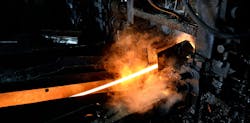Supreme Court Won’t Hear American Steel Importer’s Tariff Challenge
The Supreme Court said June 22 they would not hear the appeal for a case brought by a steel trade group that challenged President Trump’s authority to jack up steel tariffs.
It’s another disappointing result for the American Institute for International Steel, a trade group representing steel importers. The Supreme Court declined to hear their case in 2019 after the AIIS went straight from the U.S. Court of International Trade to the highest court, skipping the U.S. Court of Appeals. In March 2020, the U.S. Court of Appeals ruled against the trade group.
The tariffs, issued by President Trump in March 2018, run on the Trade Expansion Act of 1962’s Section 232, which allows the President to adjust the manner or amount of how a certain product is imported if he or she determines a threat to national security. According to the AIIS, this delegates powers to the President that the Constitution reserves for the legislative branch. In a 1976 case, the Supreme Court upheld Section 232’s constitutionality.
On the opposite side of the issue from the AIIS are U.S. steel manufacturers, who hailed the tariffs and say foreign steel manufacturers—especially China—threaten domestic steel production. The American Iron and Steel Institute released a statement June 22 praising the Supreme Court’s recent decision to allow the tariffs stand unchallenged.
“We are pleased that the U.S. Supreme Court today rightly affirmed our strong belief, and the previous decisions of the Court of International Trade and Court of Appeals, that the challenge to the Section 232 statute is without merit,” said Thomas J. Gibson, CEO of the American Iron and Steel Institute. “This lawsuit by steel importers was a weak attempt to mask the fact that surging foreign imports have severely impacted the domestic steel industry and threaten our national and economic security.” The Court’s decision, Gibson said, acknowledged that Section 232 is Constitutionally sound.
“We have consistently maintained this fact and are pleased that the highest Court agreed,” said Gibson.
According to domestic steel manufacturers, the tariffs have somewhat evened the field between American and Chinese steel manufacturing. Chinese steel manufacturers receive enough funding from their government that they can afford to overproduce steel, driving prices down and materially harming American manufacturing operations. As such, proponents of the tariffs say, the “national security” rationale for establishing the tariffs is no joke.
As such, proponents of the tariffs say, the “national security” rationale for establishing the tariffs is no joke. After the U.S. Court of Appeals ruled against the AIIS in March 2020, Richard Fruehauf, VP of strategic planning at U.S. Steel, testified to Congress on the importance of the tariffs. The Section 232 tariffs, he said, “must be kept strong.” Otherwise, a “tidal wave of foreign steel” would quickly overwhelm domestic production.
About the Author
Ryan Secard
Associate Editor
Ryan Secard joined Endeavor B2B in 2020 as a news editor for IndustryWeek. He currently contributes to IW, American Machinist, Foundry Management & Technology, and Plant Services on breaking manufacturing news, new products, plant openings and closures, and labor issues in manufacturing.
